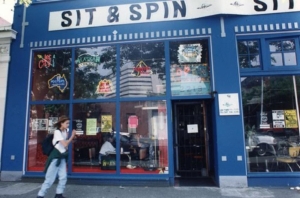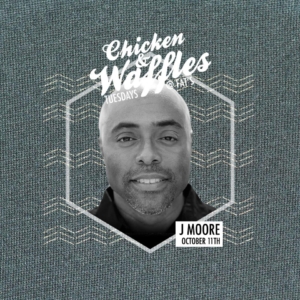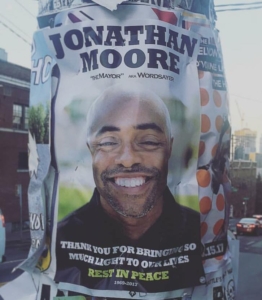Storytelling Lives: Just Keep Flying
Something has been missing. I’ve been looking for it since the election. Amid the noise of national politics I’ve felt an underlying void. There’s something that is bigger than my fear of the current administration or its impact. It’s bigger than Kellyanne Conway, Sean Spicer, and Michael Flynn. In my life, it’s bigger than whatever terrible news story will have emerged by the time this piece is read. I realized what was missing. The realization came with the death of an influential Seattle resident and the simultaneous onslaught of essays celebrating the twentieth anniversary of Buffy the Vampire Slayer. Let me explain.

Photo credit: I cleaned up vomit at Sit & Spin FB group
Jonathan Moore, a.k.a. Wordsayer, died of kidney disease at age 47 in early March. Moore was an icon of the Seattle hip-hop scene. He was everywhere, so influential that we called him “The Mayor.” I met him when he ran all-ages hip-hop shows called “Sureshot Sundays” at Sit & Spin, a club where I worked. The shows were technically illegal, because of a law Moore and others were fighting called the Teen Dance Ordinance requiring all-ages venues to carry more insurance and hire more security than anyone could reasonably afford. Hundreds of kids came through those Sunday shows; it was illegal for them to find their voice, but find it they did. Moore’s work inspired countless young people to become musicians—many of his protegees have gone on to great success. It was on one of those Sundays that a teenage Macklemore performed for the first time. Later, in his song “The Town,” Macklemore would write:
Wordsayer was my mayor and things have changed
But I carry the torch and what I do with that flame
Is lit every time that I step on the stage
The skyline is etched in my veins
You can never put that out, no matter how hard it rains
Sureshot Sundays proved to the city that all-ages music shows were not a danger to the community, and they showed hundreds of young people what was possible. When Moore died, tributes flooded into his Facebook page with the hashtag #mymayor or #themayor. I was struck by how many people started their stories with meeting Moore at 16 or 17, crediting him with life changing mentorship, wisdom, and inspiration. The messages are from people who are now professional musicians, artists, writers, and lifetime lovers of hip-hop.
Moore was one of the nicest and most generous people I’ve ever met in music. He was incredibly warm. While he was immeasurably influential in local music, constantly juggling projects, he made each person he spoke to feel like the most important person to him in the moment. In a city that has mostly left its musical mark through Nirvana and alternative grunge rock, Moore spent decades quietly building a Northwest hip-hop empire. His band, Source of Labor, was one of the first hip-hop acts to play the legendary Crocodile Café. But he quit performing to work harder at providing opportunities for others. He produced countless hip-hop shows in the city, managed and mentored musicians, was an accomplished DJ, and, as a part-time educator inside and outside of the public schools, he taught a generation of high school students how to find their voice and use it to tell their own stories.
Seattle wasn’t thought of as a hotbed of hip-hop—most of the city’s hip-hop fame up until that point was Seattle native Sir Mix-A-Lot’s chart-topping “Baby Got Back.” Where some saw little going on, Moore saw possibility. He promoted big shows with bands like The Roots, and managed small local acts. He was a promoter, an artist, a DJ, a manager, and he was a father. He never got rich, but I don’t think that was the point.

Photo credit: Jonathan Moore memorial FB page
After years of covering Moore’s work for the paper, Charles Mudede wrote a final article in The Stranger. The piece ends with an account of the last time the two saw each other, when Moore was DJ’ing at Fat’s Chicken and Waffles in Seattle not long before he died:
“Though he had just come out of another tough battle with death, he was completely absorbed by the fresh beats spinning on his computerized wheels of steel. This was his life, this music, this black American music. And when he played a beat, there was no past or future. He was completely in the time and beauty of the music. ‘In this city where it rains all day, I’m still looking sunshine, hey.’ Wordsayer ’til infinity.”
Wordsayer died too young. But his legacy will live on at every hip-hop show in Seattle for years. He found a world where young people were not allowed to dance, and he gave them the power to dance and to make their own music. He left a world where young people feel empowered to craft their own rhymes and find their own voices. His influence is infinite.
* * *
I was reading and reminiscing about Moore around the same time my social media was full of articles about the Buffy 20th anniversary. At first glance, I know it seems as though these two things have no connection, but again, bear with me.
For the uninitiated, each episode of Joss Whedon’s Buffy starts with this narration:
“In every generation there is a chosen one. She alone will stand against the vampires, the demons, and the forces of darkness. She is the Slayer.”
Buffy was a defining character for a generation, from a TV show with cultural impact that has far outlasted expectations. Its mix of romance, sci-fi, drama, horror, and comedy reflected the human experience in a way viewers hadn’t seen before. The show inspired countless homages and a spin-off; its legacy is discussed everywhere from academia to comic book forums.
Over the course of seven seasons, Buffy fought all manner of evil but also found and lost love, battled through adolescence, and staked out (pun intended) a place for herself in the world on her own terms. She learns through Slayer legend that she is the only one; that she must live this lonely existence, but she says no to all of that. (It helps, of course, that her best friend is a talented witch who can help her empower an entire next generation of Slayers so that she won’t have to wait until death to give her power to them.)
Buffy offers them power, and choice, in this speech:
“So here’s the part where you make a choice. What if you could have that power, now? In every generation, one Slayer is born, because a bunch of men who died thousands of years ago made up that rule. They were powerful men. This woman is more powerful than all of them combined. So I say we change the rule. I say my power, should be our power. Tomorrow, Willow will use the essence of this scythe to change our destiny. From now on, every girl in the world who might be a Slayer, will be a Slayer. Every girl who could have the power, will have the power. Can stand up, will stand up. Slayers, every one of us. Make your choice. Are you ready to be strong?”
Buffy is the creation of Joss Whedon, a man who inspires great passion and devotion in his fans. They cry when they approach him at events, they write fan fiction, they follow the comic books that have extended the stories beyond the end of the TV show. They attend conventions and abide by the credo of his follow-up show, Firefly, to keep flying. Firefly is a sci-fi adventure story about a group of misfits trying to survive in a world dominated by an oppressive regime. Against great odds, they live on their own terms. It lasted only one season before it was cancelled, but the level of engagement in the show remained so high Whedon was able to make a movie sequel, Serenity.
In numerous interviews, Whedon has been asked whether he’s bothered by the overwhelming emotional response to his work. He responds by saying that it doesn’t bother him at all. He shares the emotion of his fans; he wrote Buffy to instill a high level of devotion. Whedon says that writing narrative is his religion, and his writing is meant to reflect the emotion of the human experience back to us in a way that helps us understand our own lives. It’s intensely personal because it’s supposed to be.
On the subject of the kind of fan community a good story can elicit, Whedon is effusive. Recently I watched a video of him giving this speech at a comic convention, to thunderous applause:
“When you come out of a great movie… you feel like you are in that world. … You come out of these certain things and the world has become that. When you’re telling a story you are trying to connect to people in a particular way, it’s not just about what you want to say, it’s about inviting them into a world. And the way in which you guys have inhabited this world, this universe, has made you part of it. Part of the story. You are living in Firefly. When I see you guys I don’t think the show’s off the air, I don’t think there’s a show. I think that’s what the world is like. I think there’s spaceships. I think there’s horses. … The story is alive because of you.”
Whedon’s Buffy called her audience to their power, and Moore empowered musicians by providing a stage.
* * *

Photo credit: Jonathan Moore memorial FB page
I found what I was looking for. If narrative reflects our lives back at us, and we can all be a part of the story, then it is in stories where everything and anything is possible. It’s in stories that we find inspiration to know and understand the things that feel impossible to comprehend. This is where I find strength—in stories. Jonathan Moore wrote, and taught people to write. His legacy allows thousands of others to feel welcome to do the same. Joss Whedon writes, and has created something that everyone can feel a part of.
There has been so much noise, so much distraction, and so much anxiety about what’s at stake in national politics. That’s understandable. But I don’t want the world to be dominated by political adversity. I want to live on my own terms. Moore did. The characters of the Whedonverse continue to. We have the choice to tell our stories. When we do, people join in and are inspired. We have the choice to invite people into our worlds. We have the power to include everyone, and to use our stories to remember that we can create our own worlds where the things we love—whatever they are—are the things that reign. #mymayor #Buffylives
 Emma Margraf is a writer who lives in Olympia, Washington. She is an MFA candidate at Antioch University Los Angeles and a government employee. She generally writes about foster parenting, food, or people she thinks are interesting. You can find her on Twitter @emargraf.
Emma Margraf is a writer who lives in Olympia, Washington. She is an MFA candidate at Antioch University Los Angeles and a government employee. She generally writes about foster parenting, food, or people she thinks are interesting. You can find her on Twitter @emargraf.





